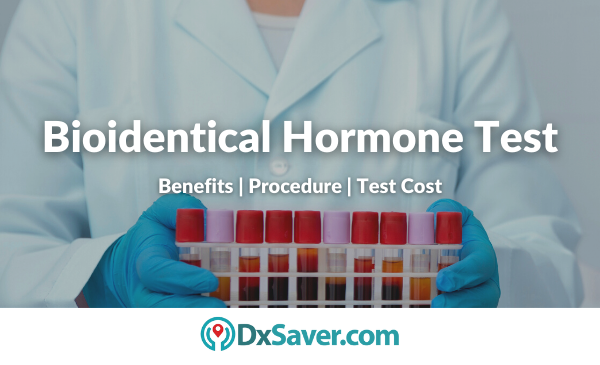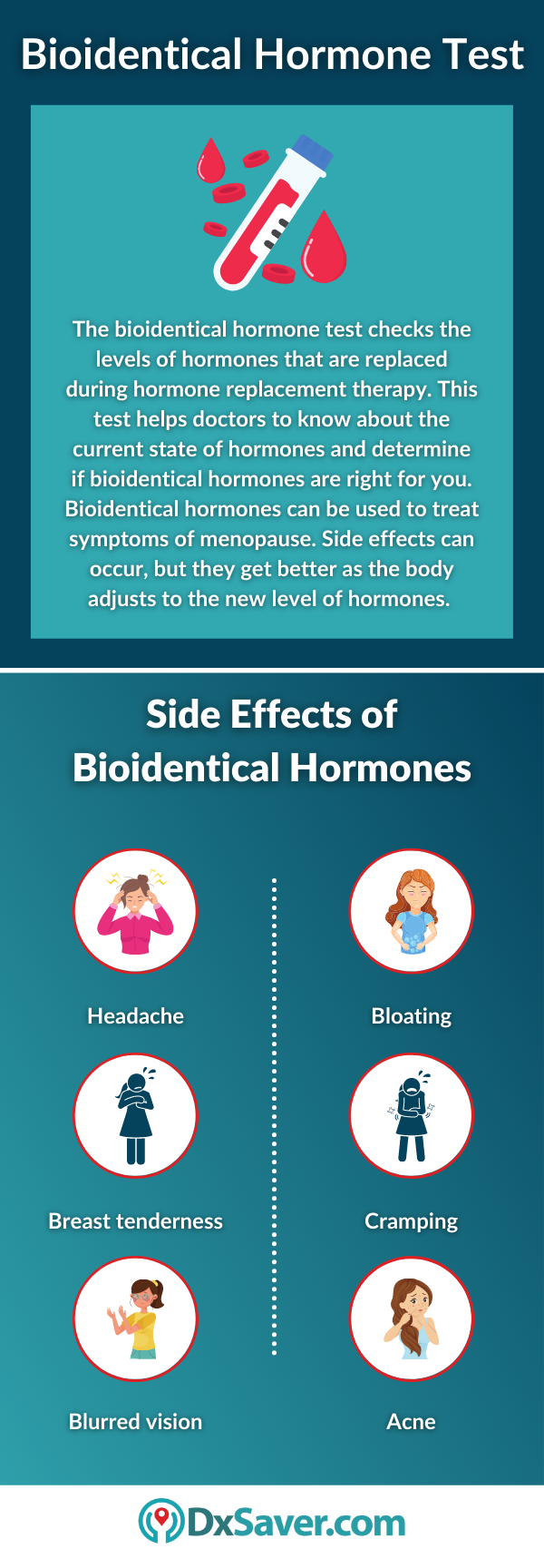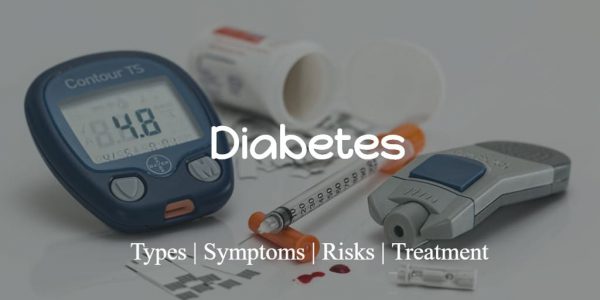
Bioidentical hormones are chemically the same as those that the human body produces. These hormones are made in a lab and can come in different forms. They are used as a treatment for both men and women whose own hormones are low or out of balance. Before starting the treatment, a bioidentical hormone test can help your doctor to gain a better understanding of the current state of your hormones and determine if bioidentical hormones are right for you.
This article covers all the significant topics related to the bioidentical hormone test such as the test cost, preparation for tests, risk factor, and how to get tested for a bioidentical hormone test.
- What are hormones?
- What are bioidentical hormones?
- Uses of bioidentical hormones
- Risks of bioidentical hormones
- Side effects of bioidentical hormones
- Bioidentical hormone test
- How should you prepare for the bioidentical hormone test?
- What happens during the bioidentical hormone test?
- Risk of bioidentical hormone test
- Provider locations
For our readers who are interested in knowing the bioidentical hormone test cost beforehand, we begin with that section.
How much does the bioidentical hormone test cost?
Bioidentical hormone test costs range around $175 in different labs and facilities across the US. Prior appointment isn’t required. You can order tests online by comparing the price or visiting the nearest lab during lab business hours. You will get the results in your email in 2 to 3 business days after completing the procedure. Apart from this, doctor consultation is available for any kind of further treatment or medical advice.
The table below shows the bioidentical hormone test provider and their prices. You can know more and book the test by clicking on the “Book Now” button.
Name of our Partner Labs | Book Online at Offer Price |
HealthLabs
| $175 |
Bioidentical hormone test cost with insurance
Many insurance companies in the U.S. cover all the vital tests like the bioidentical hormone test. However, the coverage provided by private health insurance companies and national health insurance programs like Medicare varies widely. Most of the health insurance policies cover bioidentical hormone test costs only once or twice a year and when your physician orders more than twice in a year, you should pay the test cost out of pocket. So, you are recommended to check if your health insurance policy covers the bioidentical hormone test cost.
Our bioidentical hormone testing providers do not accept any kind of health insurance policy. However, they can provide you with an itemized receipt containing all the details viz the name of the test, code of the test, and CPT code which is necessary for insurance reimbursement purposes.
What are hormones?
Hormones are special chemicals made by your endocrine glands. They are messengers that notify other parts of the body how and when to work. These hormones control some functions in your body like metabolism, reproduction, growth, and sexual function. Symptoms can take place when hormones are out of balance. A hormone imbalance can affect your day-to-day life. In this case, taking hormones can help people whose bodies don’t make enough of a certain hormone, or whose hormone levels are unbalanced.
What are bioidentical hormones?
Bioidentical hormones are chemically the same as those that the body produces and are just one type of man-made hormone available. The bioidentical hormones are made in a laboratory and they imitate the hormones the body produces naturally. They are made from a variety of sources that span plant and animal products. Bioidentical hormones can treat both women & men whose own hormones are low or out of balance. And certain forms of bioidentical hormones are pre-made by a drug company. Whereas other forms are custom-made by a pharmacist based on a doctor’s order, it is called compounding.
FDA has approved various preparations of bioidentical estradiol & progesterone, that are molecularly identical to the structure of the hormones generated by the human body. However, the compounded forms haven’t been tested or approved by the FDA. Usually, customized bioidentical hormones are advertised as safer, natural, more effective, and individualized alternatives to conventional hormone therapy. But these claims remain unsupported and there is also the lack of FDA oversight for compounded hormones. And it causes additional risks regarding the purity and safety of custom-compounded bioidentical hormones.
There are several ways to get bioidentical hormones, it may include pills, patches, creams, gels, shots, and implanted pellets. Doctors will decide which form is best for you. You may also try more than one way before finding the one that works well.
Uses of bioidentical hormones
Bioidentical hormones can be used to treat symptoms of menopause in women. This treatment replaces the hormones that have been lost with hormone therapy. Thereby hormone levels will increase and symptoms will improve.
Some effects of low hormones may include:
- Fatigue
- Hot flashes
- Night sweats
- Problems sleeping
- Memory loss
- Loss of energy
- Loss of muscle mass
- Weight gain
- Foggy thinking
- Mood changes
- Vaginal dryness
- Loss of interest in sex
- Pain during sex
Risks of bioidentical hormones
There is not enough evidence to recommend that bioidentical hormone therapies are safe and effective. According to some research, there are certain risks for women who take hormones (hormone therapy). It can increase the risk of blood clots, stroke, gallbladder disease, heart disease, and breast cancer. Although many doctors who use bioidentical hormones claim they are safer than regular HRT, there are no large research studies of bioidentical hormones. Additionally, bioidentical hormones therapy may prevent a doctor from diagnosing a more serious illness like an autoimmune disease if it is present.

Side effects of bioidentical hormones
Though side effects can occur when a dose is first given many side effects get better as the body adjusts to the new level of hormones. Common side effects may include:
- Weight gain
- Cramping
- Bloating
- Indigestion
- Tiredness
- Headaches
- Breast tenderness
- Spotting
- Acne
- Blurred vision
- Increased facial hair in women
- Mood swings
Apart from this, you may also feel itchy around the area where you get a shot or where you apply your hormones if you use a patch, cream, or gel.
Bioidentical hormone test
A bioidentical hormone test checks the levels of hormones that are generally replaced during hormone replacement therapy. The key hormones produced by the ovaries are tested. It includes the progesterone test, estrogen test, and estradiol test. Before starting the hormone treatment, a bioidentical hormone test can help your doctor to gain a better understanding of the current state of your hormones and determine if bioidentical hormones are right for you.
How should you for prepare the bioidentical hormone test?
Generally, you don’t need to take any special measures to prepare for the bioidentical hormone test. But for women, the timing of the sample will be correlated with the menstrual cycle or, if pregnant, with the gestational age of the baby.
What happens during the bioidentical hormone test?
This test requires a blood sample. Your nurse or health care professional uses a needle to take a blood sample, usually from the arm. A band will be tied around the upper part of your arm to make the vein fill with blood & swell up. And your health care professional will clean the area with an antiseptic to help prevent infection. After inserting the needle, the blood will be collected into a vial or test tube. You may feel a quick sting or pinch when the needle goes in/out. After taking the sample they will remove the needle & band. And your health care professional will put a piece of gauze over the spot to stop the bleeding. Normally, this blood test takes only a few minutes.
Risk of bioidentical hormone test
There is little risk in having a bioidentical hormone test. It is common to have minor pain, slight bleeding, or bruising in the area where the needle was inserted. But the symptoms go away quickly.
Provider locations
A bioidentical hormone test can be done in any of the following locations by visiting the lab near you. To know the bioidentical hormone test cost, refer to the first section of the article.
- Alabama
- Alaska
- Arizona
- Arkansas
- California
- Colorado
- Connecticut
- Delaware
- Florida
- Hawaii
- Georgia
- Idaho
- Illinois
- Indiana
- Iowa
- Kansas
- Kentucky
- Louisiana
- Maine
- Michigan
- Minnesota
- Mississippi
- Missouri
- Montana
- Nebraska
- Nevada
- New Hampshire
- New Mexico
- North Carolina
- North Dakota
- Oklahoma
- Oregon
- Pennsylvania
- Puerto Rico
- South Carolina
- South Dakota
- Tennessee
- Texas
- Utah
- Vermont
- Virginia
- Washington
- West Virginia
- Wisconsin
- Wyoming
Frequently Asked Questions
Will insurance cover my testing cost?
No, insurance will not be covered in the billing. However, they will provide you with a receipt for insurance reimbursement purposes.
How should I book my appointment?
You can choose the most suitable provider from above and make an appointment by following the instructions mentioned by them.
Can I cancel my lab test order?
Yes, you can cancel your lab test order any time before your testing. A refund will be initiated after deducting the cancellation fee. However, cancellation is at the discretion of the provider.
Do the providers offer result interpretations?
Yes, a few providers may provide doctor consultation who will take you through the results and provide clarification if needed.
How do I receive my report?
To ensure your privacy, the test report will be mailed to you by the provider.
Other topics you may also be interested in:-
- ALT Blood Testing Cost
- Fibrinogen Test Cost in the U.S.
- Arsenic Blood Test – Causes, Symptoms & Treatment of Arsenic poisoning
- What is CoQ10?
- What is the Mineral Deficiency Test?
- What is MMA Fighter Blood Test?
- Glucose Blood Test: Purpose, Procedure and Test Results
- What is Perimenopause in Women?
- Symptoms of Lactose Intolerance
- Causes of Zika Virus and their Symptoms
- Importance of Aldosterone to Renin Ratio
- What is BNP Blood Test? – Causes & Symptoms of High & Low BNP Levels
- What is a Parathyroid Hormone?
- Importance of Microalbumin
- What is a Titer Test?
- What is the Myasthenia Gravis Test?






